 Software Tutorial
Software Tutorial
 Office Software
Office Software
 How to display the full path of a file in the title bar of word 2007
How to display the full path of a file in the title bar of word 2007
How to display the full path of a file in the title bar of word 2007
How to display the full path of the file in the title bar of word2007
Word provides the "macro" function, which can help users automatically complete some complex repetitive operations and improve editing efficiency. When you create a macro, you can give it a special name so that it can run automatically under certain conditions. Such a macro is called an automatic macro. The AutoOpen macro will run automatically every time an existing document is opened. Then we can give the macro the function of displaying the full path of the document in the title bar, so that Word can automatically display the full path of the document in the title bar. The method to create AutoOpen macro is as follows:
1. Open the Word document and click the "Tools" option in the top menu bar. 2. Find and click the "Macro" option in the drop-down menu. 3. Click the "Macro" button in the pop-up window (as shown in the figure below). 4. The above is the operation method applicable to the Word 2003 version. If you are using another version of Word, please refer to the operating guide of the corresponding version.
In Word, open "View" -> "Macros" -> "View Macros" (as shown in the figure). For the 2007 version of Word, follow the same steps.
2. Fill in "AutoOpen" in the "Macro Name" column of the pop-up box (this is a special macro name, set the macro command to run automatically when word is opened), and click "Create" (as shown in the figure below) Show);
3. In the pop-up macro command code editing window, enter the command: ActiveWindow.Caption=ActiveDocument.FullName, then save and close the editing window (as shown in the figure below);
4. Close word, then reopen the word document, and you will find that the full path of the document is displayed in the title bar
Where is the Word template path
1. Open the word document, click the Office button in the upper left corner, and then select the word option.

2. Select Advanced in the word options, and then drag the slider on the right to find the file location.
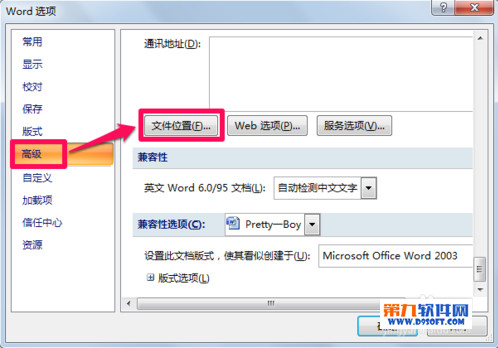
3. Double-click the word user template in the file location to open the modified location.
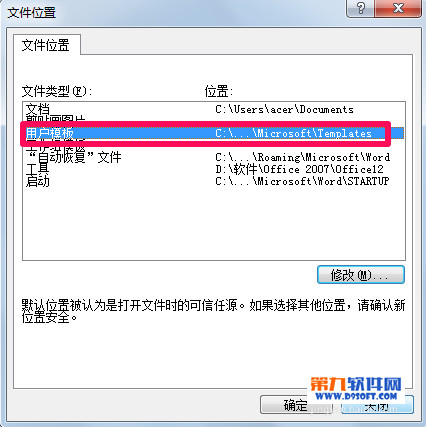
4. Copy the word template file path "C:UsersacerAppDataRoamingMicrosoftTemplates" in the dialog box.
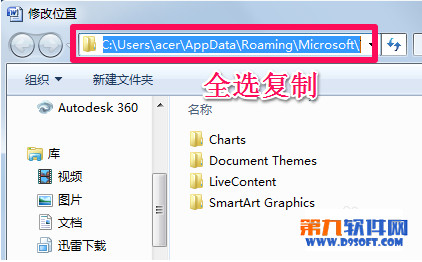
5. Open a folder at will, then paste the word template file path and press the Enter key. The word template will be opened. If you want to delete the word template, just select and delete it.
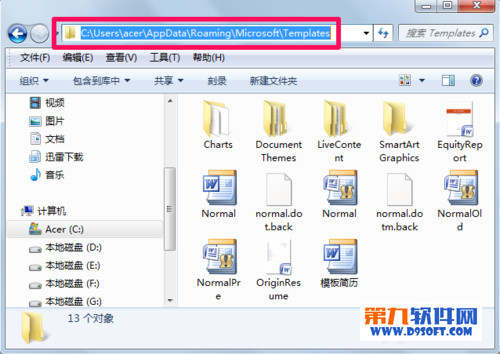
word template path modification
It is very simple to modify the word default template path. After opening the word template path in step 3 above, reselect the word template path location in the modification position, and then click OK.
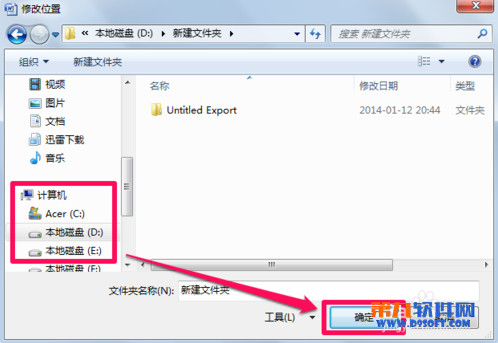
If you need to modify the word template path, you can refer to the second part of the tutorial above.
How to display the full path of the document in word2007
If others are using 2003, they must download a Microsoft Office 2007 file format compatibility package
Because the document format (DOSX) created in 2007 is different from that in 2003, even if you edit the document in 2007, it cannot be opened in 2003.
However, if you create a document in 2007, everyone who looks at your document must download a format compatibility package. How troublesome it is, especially if you create a report and hand it to you. Your boss, but you ask him to download a format compatibility package, that is so irrational. It is recommended that after editing in 2007, you save it in the format common before 2003 (i.e. DOS format). However, if this is the case, you will lose the style and functions added in 2007, which is no different from the original document edited in 2003. Any difference does not bring any functional improvement.
Word is a powerful text editing tool, but in fact people usually only use very few of its functions, and most of the functions are wasted. Therefore, although there are improvements in 2007 compared to 2003, you may not know the improvements. When can it be used?
Weighing the pros and cons, I can’t wait to uninstall Office 2007 which has just been installed for two days!
I am happy to answer the poster’s question. Please forgive me if there are any mistakes
The above is the detailed content of How to display the full path of a file in the title bar of word 2007. For more information, please follow other related articles on the PHP Chinese website!

Hot AI Tools

Undresser.AI Undress
AI-powered app for creating realistic nude photos

AI Clothes Remover
Online AI tool for removing clothes from photos.

Undress AI Tool
Undress images for free

Clothoff.io
AI clothes remover

AI Hentai Generator
Generate AI Hentai for free.

Hot Article

Hot Tools

Notepad++7.3.1
Easy-to-use and free code editor

SublimeText3 Chinese version
Chinese version, very easy to use

Zend Studio 13.0.1
Powerful PHP integrated development environment

Dreamweaver CS6
Visual web development tools

SublimeText3 Mac version
God-level code editing software (SublimeText3)

Hot Topics
 1359
1359
 52
52
 5 Things You Can Do in Excel for the Web Today That You Couldn't 12 Months Ago
Mar 22, 2025 am 03:03 AM
5 Things You Can Do in Excel for the Web Today That You Couldn't 12 Months Ago
Mar 22, 2025 am 03:03 AM
Excel web version features enhancements to improve efficiency! While Excel desktop version is more powerful, the web version has also been significantly improved over the past year. This article will focus on five key improvements: Easily insert rows and columns: In Excel web, just hover over the row or column header and click the " " sign that appears to insert a new row or column. There is no need to use the confusing right-click menu "insert" function anymore. This method is faster, and newly inserted rows or columns inherit the format of adjacent cells. Export as CSV files: Excel now supports exporting worksheets as CSV files for easy data transfer and compatibility with other software. Click "File" > "Export"
 How to Use LAMBDA in Excel to Create Your Own Functions
Mar 21, 2025 am 03:08 AM
How to Use LAMBDA in Excel to Create Your Own Functions
Mar 21, 2025 am 03:08 AM
Excel's LAMBDA Functions: An easy guide to creating custom functions Before Excel introduced the LAMBDA function, creating a custom function requires VBA or macro. Now, with LAMBDA, you can easily implement it using the familiar Excel syntax. This guide will guide you step by step how to use the LAMBDA function. It is recommended that you read the parts of this guide in order, first understand the grammar and simple examples, and then learn practical applications. The LAMBDA function is available for Microsoft 365 (Windows and Mac), Excel 2024 (Windows and Mac), and Excel for the web. E
 If You Don't Use Excel's Hidden Camera Tool, You're Missing a Trick
Mar 25, 2025 am 02:48 AM
If You Don't Use Excel's Hidden Camera Tool, You're Missing a Trick
Mar 25, 2025 am 02:48 AM
Quick Links Why Use the Camera Tool?
 Microsoft Excel Keyboard Shortcuts: Printable Cheat Sheet
Mar 14, 2025 am 12:06 AM
Microsoft Excel Keyboard Shortcuts: Printable Cheat Sheet
Mar 14, 2025 am 12:06 AM
Master Microsoft Excel with these essential keyboard shortcuts! This cheat sheet provides quick access to the most frequently used commands, saving you valuable time and effort. It covers essential key combinations, Paste Special functions, workboo
 Use the PERCENTOF Function to Simplify Percentage Calculations in Excel
Mar 27, 2025 am 03:03 AM
Use the PERCENTOF Function to Simplify Percentage Calculations in Excel
Mar 27, 2025 am 03:03 AM
Excel's PERCENTOF function: Easily calculate the proportion of data subsets Excel's PERCENTOF function can quickly calculate the proportion of data subsets in the entire data set, avoiding the hassle of creating complex formulas. PERCENTOF function syntax The PERCENTOF function has two parameters: =PERCENTOF(a,b) in: a (required) is a subset of data that forms part of the entire data set; b (required) is the entire dataset. In other words, the PERCENTOF function calculates the percentage of the subset a to the total dataset b. Calculate the proportion of individual values using PERCENTOF The easiest way to use the PERCENTOF function is to calculate the single
 How to Create a Timeline Filter in Excel
Apr 03, 2025 am 03:51 AM
How to Create a Timeline Filter in Excel
Apr 03, 2025 am 03:51 AM
In Excel, using the timeline filter can display data by time period more efficiently, which is more convenient than using the filter button. The Timeline is a dynamic filtering option that allows you to quickly display data for a single date, month, quarter, or year. Step 1: Convert data to pivot table First, convert the original Excel data into a pivot table. Select any cell in the data table (formatted or not) and click PivotTable on the Insert tab of the ribbon. Related: How to Create Pivot Tables in Microsoft Excel Don't be intimidated by the pivot table! We will teach you basic skills that you can master in minutes. Related Articles In the dialog box, make sure the entire data range is selected (
 How to Use the GROUPBY Function in Excel
Apr 02, 2025 am 03:51 AM
How to Use the GROUPBY Function in Excel
Apr 02, 2025 am 03:51 AM
Excel's GROUPBY function: Powerful data grouping and aggregation tools Excel's GROUPBY function allows you to group and aggregate data based on specific fields in a data table. It also provides parameters that allow you to sort and filter the data so that you can customize the output to your specific needs. GROUPBY function syntax The GROUPBY function contains eight parameters: =GROUPBY(a,b,c,d,e,f,g,h) Parameters a to c are required: a (row field): A range (one column or multiple columns) containing the value or category to which the data is grouped. b (value): The range of values containing aggregated data (one column or multiple columns).
 How to Completely Hide an Excel Worksheet
Mar 31, 2025 pm 01:40 PM
How to Completely Hide an Excel Worksheet
Mar 31, 2025 pm 01:40 PM
Excel worksheets have three levels of visibility: visible, hidden, and very hidden. Setting the worksheet to "very hidden" reduces the likelihood that others can access them. To set the worksheet to "very hidden", set its visibility to "xlsSheetVeryHidden" in the VBA window. Excel worksheets have three levels of visibility: visible, hidden, and very hidden. Many people know how to hide and unhide the worksheet by right-clicking on the tab area at the bottom of the workbook, but this is just a medium way to remove the Excel worksheet from the view. Whether you want to organize the workbook tabs, set up dedicated worksheets for drop-down list options and other controls, keeping only the most important worksheets visible, and



